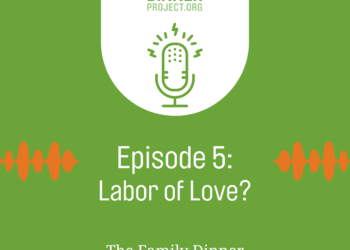[ad_1]

This reflection was contributed by Mona Fishbane, Ph.D., a medical psychologist and writer of Loving with the Brain in Mind: Neurobiology & Couple Therapy.
Shabbat (the Jewish Sabbath) is the highpoint of our week. All the opposite days are oriented towards Shabbat — purchasing on Monday, beginning cooking Tuesday or Wednesday. I ask my husband, “Honey, are you able to chop and saute the onions?” From that modest starting, soups, rice pilafs, quiches, vegetarian chopped liver all spring (our house is vegetarian). Relatively than doing all of the preparation in sooner or later (I’m too previous for that!), I “sneak up” on Shabbat cooking, doing a bit of every day to arrange for Friday night time dinner and Saturday lunch.
I grew up with Shabbat as the middle of household life. Mother was a beautiful cook dinner, and we normally had company Friday night time. I imbibed her confidence in internet hosting, from cooking to welcoming company to the timing of when to serve every course. Mother discovered this from her grandparents, in whose house in a Polish shtetl she spent a lot of her childhood. Mother’s grandfather would come house from synagogue Friday night time, bringing company who wanted a spot to eat. Mother’s grandmother would peek from an upstairs window as he walked up the road, counting the individuals with him. She would run and set the desk for the precise variety of company. Everybody felt welcomed. Shabbat hospitality is a multigenerational legacy I inherited, and have handed on to my youngsters. Even the eating room desk to which we invite company has intergenerational resonances for us: It’s the similar desk the place my husband ate Shabbat meals in his mother and father’ home. Every Shabbat I reconnect in my coronary heart with my beloved late mother-in-law amid recollections of her scrumptious cooking.
Considered one of my favourite elements of Friday night time when our youngsters lived at house was blessing every of them with the Priestly blessing, invoking the Divine mild to shine upon them. Now they offer this blessing to their youngsters. Even now, if our youngsters and grandchildren be a part of us, this blessing is a spotlight earlier than the meal.
Inviting company, and imagining doable conversations, is a part of the enjoyable. Will we invite one couple, good pals, deepening connections by way of private sharing and research of the weekly Torah portion? Will we discover the challenges of ageing, providing one another help and knowledge? Or maybe we’ll invite a gaggle of people that don’t know one another, anticipating the doable inter-connections and move of power amongst our company. We’re significantly attuned to new individuals on the town who would welcome an invite. We ourselves have been new on the town just a few years in the past, and have been blessed with hospitality and friendships that blossomed round Shabbat tables.
One of many treats of being a visitor in one other’s house is discovering new delights for the palate, requesting the recipe, attempting it out. Considered one of my very own favorites is cholent, a mix of veggies, beans, barley and meat (in our house, vegetarian meat) that cooks in a single day in a crockpot, moistened with broth, wine, honey, ketchup, and barbecue sauce. I put it up simply earlier than lighting the Shabbat candles Friday night. After we wake on Saturday morning, the aroma of cholent permeates the home, filling me with gratitude and anticipation.
On Shabbat we’re freed from gadgets and distractions. Throughout weekdays, telephones ring or ping, computer systems beckon. I juggle the to-do record, addressing the sensible points of our lives. After which, simply earlier than we mild Shabbat candles, all gadgets are turned off. I breathe a sigh of delight, reduction, and anticipation of 25 hours of peace. Going to synagogue, studying, finding out, and sharing time with family and friends are on the agenda–not paying payments or doing errands. The nineteenth century thinker Ahad Ha’am taught, “Greater than Jews have saved Shabbat, Shabbat has saved the Jews.” We’re sustained by these 25 hours, as we refocus, refresh, refuel.
The blessings earlier than and after consuming remodel this bodily act into a chance for gratitude. In considered one of my lessons on Hasidic texts, I discovered to formulate an intention after consuming for the way I need to metabolize this meals. Meals consumed turns into power; to what do I need to dedicate the power from this meal? Gratitude and intentionality are central: Conscious that we’ve got been given the present of meals, we search to rework our consumption into actions which might be useful on this planet. On the Shabbat desk, a meal is not only meals; company are honored, and a non secular focus informs the bodily act of consuming. For the presents of Shabbat, friendship, good meals, and the presence of the Divine, I’m grateful each week.
I can affirm Ahad Ha’am’s perception: Shabbat sustains me, offers me area to breathe and decelerate, a 25 hour break from the hubbub and depth of every day life. A day with out watching the information or checking social media and emails, a break from gadgets and distractions. A desk laden with scrumptious meals, surrounded by beloved company, cultivating a non secular focus. What a blessing.
[ad_2]
Source_link





